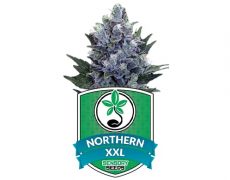Published on: 07/07/2023
CANNABINOL: A SUBSTANCE STILL UNDER STUDY, BUT WITH INTERESTING PROSPECTS
Among all the chemical compounds found in the cannabis plant, cannabinol (CBN) is one of the most promising. Although being less well known than other cannabinoids such as THC and CBD, CBN is increasingly attracting the attention of scientists and researchers for its interesting, potential and therapeutic effects.
Have we intrigued you? Well, let’s explore in detail all there is to know about cannabinol, including its properties currently being studied, its effects, and the ways it could be used.
What is cannabinol
Cannabinol, known by the acronym CBN, is a chemical compound that belongs to the cannabinoid (from weed seeds) family and is produced from THC when it is exposed to air and heat. For example, it is possible to find significant amounts of this substance (although always less than other cannabinoids) in buds that have been left in the air for a long time and which, as they age, increase their percentage of this substance.
It is one of the main cannabinoids present in the cannabis plant and, although it was discovered in the 1930s, it is only recently that scientific research has begun to take an interest in its therapeutic properties. Therefore, everything we know (and are about to tell you in this article) is still being studied and will need to be confirmed by further data.
It appears that cannabinol binds to receptors that contribute to pain-relieving, anti-inflammatory responses and that it may inhibit the production of neuronal signaling enzymes.
Read also: Why everyone is talking about genetically modified cannabis even though it doesn’t exist


The properties of CBN
In preliminary studies, CBN has been shown to be effective in reducing pain, and one of the main possible properties of CBN could be sedative, which would make it useful for treating insomnia and inducing sleep. In addition, cannabinol has been studied for its anti-inflammatory activity, which could help reduce chronic pain, arthritis and other inflammatory conditions.
Other research suggests that CBN may also have a potential antibacterial effect, counteracting certain antibiotic-resistant strains of bacteria, especially in the case of an antibiotic-resistant strain of staphylococcus.
Furthermore, CBN could play a role in the prevention of neurodegenerative diseases, such as Alzheimer’s, as it appears to have antioxidant and anti-inflammatory properties that protect brain cells.
However, further research will be needed to confirm these properties and better understand the mechanism of action of CBN.
A further note must be made regarding the concentrations of cannabinol in cannabis plants. Indeed, since CBN is present in much smaller quantities than other cannabinoids such as THC and CBD, specific extraction techniques may be required to obtain significant quantities of CBN for therapeutic purposes. In any case, the properties of CBN make this compound an interesting object of study for research on cannabis, cannabis seeds and alternative medicine.
Differences between cannabinol CBN and cannabidiol CBD
Cannabidiol is one of the main cannabinoids found in cannabis and has gained much attention for its anti-inflammatory, analgesic, anxiolytic and anticonvulsant effects. In contrast, cannabinol is formed when tetrahydrocannabinol (THC), the main psychoactive compound in cannabis, is exposed to air or light, and has sedative and relaxing properties (to be confirmed).


Furthermore, while CBD is not psychoactive and does not cause ‘euphoric’ effects, CBN may have a slightly sedative effect and cause drowsiness, as it acts on sleep receptors in the brain. To be fair, however, we reiterate that this last statement is still only a hypothesis and not supported by confirmed studies.
In terms of therapeutic use, CBD is aimed at treating disorders such as anxiety, epilepsy, chronic pain and inflammation, while CBN could be useful for treating insomnia and pain.
Read also: Hemp Body Car: when Ford thought of marketing a car made of… hemp!
How is cannabinol marketed?
Cannabinol can be found for sale in several forms, including:
Cannabinol oil: CBN oil is a filtered and purified form of cannabinol, combined with other edible oils. It can be taken orally or mixed into food and drink;
CBN capsules: capsules are another convenient form of CBN use that offer precise dosing;
Creams and lotions: topical use of cannabinol is also being explored. It could have a soothing effect due to its anti-inflammatory power.
It should be noted that although we have briefly described in the above descriptions how these products are usually used, in our country the law prohibits their consumption in any form, ever.
Also, a caveat for readers who follow us from abroad, and who reside in states where CBN consumption is permitted: although cannabinol is generally considered safe and well-tolerated, it is important to note that research into its effects is still limited and that further research is needed to confirm its safety and long-term efficacy.
If cannabis and its products fascinate you, we recommend a visit to our Sensoryseeds shop for marijuana seeds (such as fast growing weed seeds) that will add to your personal collection.









